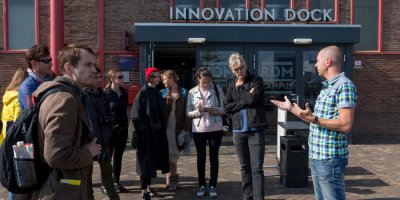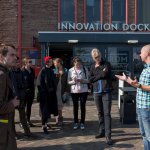
Workers in the digital age need more supportive digital ecosystems. Source: Shutterstock
IDC director says culture will shape tomorrow’s digital workforce
THE FUTURE of work is a hotly debated topic but discussions tend to revolve around technology rather than people.
However, as younger generations join the workforce and digital business models become mainstream, companies need to understand that peoples’ expectations are undergoing major shifts.
“The younger generations have become accustomed to an anytime, anywhere mobile world, and expect the same ease of use and on-demand services when working for a company,” advised IDC Future of Work Research Director Avinav Trigunait.
IDC’s subject matter expert points out that artificial intelligence (AI) is an exciting technology with many useful applications such as in healthcare research. As a result, it has triggered discussions about the future of work, raising questions about jobs being lost to intelligent hardware and software robots.
“In my view, the future of work (FoW) is a broader topic than just the advent of AI. We need to take a fresh look at all aspects of work in the wake of new expectations and technology advancements.”
IDC defines the future of work as a fundamental change to the concept of work which transforms worker behaviors and skills as well as organizational culture, supports a dynamic work environment not bound by time of day or physical space, empowers teams and a diverse workforce, and fosters human-machine collaboration.
Of those, creating and sustaining a culture that people can connect with and rally behind is one of the most complex business problems, Trigunait points out.
“In addition, culture may often take a backseat or seem like a trivial discussion, in the broader context of business complexities and technology transformation priorities.”
However, with newer generations at work, and their changing expectations from an employer besides just a paycheck, and more importantly social media giving a voice to everyone, work culture is increasingly becoming an area of focus.
The future work culture, IDC believes, refers to the distinctive beliefs and values of an organization and talent management practices and how effectively they achieve and retain a highly engaged and motivated workforce that is aligned to corporate strategies and goals.
It encompasses the development and institutionalization of policies, metrics, and key behavioral indicators (KBIs) that are aligned with the company’s future of work vision.
In Trigunait’s words, here are the key work culture imperatives that organizations must focus on:
# 1 | Worker/employee experience
It is critical for organizations to create a superior EX in order to keep their talent pool engaged and motivated.
As the war for talent intensifies, offering employees a great working experience is also critical to attract and retain the best talent. If the workforce is engaged and motivated, they will, in turn, deliver great services and experiences to end customers.
In IDC’s Future of Work FutureScapes 2019, IDC predicts that by 2021, at least 60 percent of Global 2000 companies will actively monitor and manage EX and utilize EX as a key differentiator to build and maintain B2B and B2C relationships.
# 2 | Talent management and development
Many organizations are struggling to keep pace with digital transformation, and one of the key challenges is the lack of digital skills.
In IDC 2018 Asia Pacific Future of Work survey, lack of digital skill was rated among the top three challenges faced by decision makers.
With the rapid pace of technology advancements and business model changes, getting the right people and more importantly retaining them along with developing the skills for the future will be crucial for companies to succeed and drive competitive differentiation.
The survey found that 48 percent of organizations are running training programs designed to meet the digital skills needed for future projects.
In addition, the need for soft skills is gaining traction with creativity, problem-solving, communications, and a collaborative mindset being key. About 46 percent indicated that they are increasingly utilizing and training employees on design thinking and agile methodologies to create a digital and innovation focused mindset.
# 3 | FoW metrics and KBIs
According to Trigunait, metrics that go beyond traditional productivity and ROI will be extremely crucial for organizations to gauge their overall performance and define their work culture.
As a result, many progressive organizations are scrapping annual reviews in favor of real-time performance management. Managers are also taking on a coaching role to guide employee behavior than just setting targets.
Several AI‑enabled assessment tools have also emerged to support the manager‑as‑a-coach model, offering new performance metrics that can be used to recognize employee achievements in real time.
By 2022, IDC predicts that 35 percent of businesses will replace traditional KPIs with KBIs (key behavioral indicators) to measure collaboration, communication, problem-solving skills, deliverables, and objectives.
# 4 | Organizational structure.
Borderless, agile, and flat companies are organized for speed, adaptability, and to source and deliver innovation, along with ecosystem partners, much faster than traditional organizations.
Organizations are utilizing several tactics these days — such as gig and crowdsourcing platforms, as well as moving employees to coworking spaces — to enable collaboration and innovation through a broader ecosystem.
Trigunait points out that many global professional services companies such as Accenture, Aon, Deloitte, Ernst & Young, and PwC have already created freelance marketplaces to fill their contingent hiring needs. The coworking adopters also include many large companies such as Adidas, HSBC bank, UBS bank, Microsoft.
At the end of the day, the message is clear: Organizations must inculcate a collaborative and innovation focused work culture and mold themselves into a smarter and more agile structure to make the most of tomorrow’s intelligent and futuristic workforce.
READ MORE
- Ethical AI: The renewed importance of safeguarding data and customer privacy in Generative AI applications
- How Japan balances AI-driven opportunities with cybersecurity needs
- Deploying SASE: Benchmarking your approach
- Insurance everywhere all at once: the digital transformation of the APAC insurance industry
- Google parent Alphabet eyes HubSpot: A potential acquisition shaping the future of CRM








